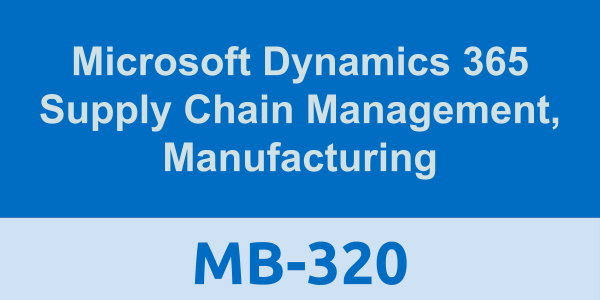Candidates for this exam are functional consultants who analyze business requirements and translate those requirements into fully realized business processes and solutions that implement industry best practices. Candidates serve as a key resource in implementing and configuring applications to meet business requirements.
Candidates for this exam have a fundamental understanding of accounting principles and financial operations of businesses, customer service, field service, manufacturing, retail, and supply chain management concepts.
Candidates for this exam typically specialize in one or more feature sets of Finance and Operations, including finance, manufacturing, and supply chain management.
Candidates must have some knowledge of manufacturing practices.
Microsoft Supply Chain Management, Manufacturing Exam Summary:
| Exam Name | Microsoft Certified - Dynamics 365 Supply Chain Management, Manufacturing Functional Consultant Associate |
| Exam Code | MB-320 |
| Exam Price | $165 (USD) |
| Exam Price | 120 mins |
| Number of Questions | 40-60 |
| Passing Score | 700 / 1000 |
| Books / Training | MB-320T00: Microsoft Dynamics 365 Supply Chain Management, Manufacturing |
| Sample Questions | Microsoft Supply Chain Management, Manufacturing Sample Questions |
| Practice Exam | Microsoft MB-320 Certification Practice Exam |
Microsoft MB-320 Exam Syllabus Topics:
| Topic | Details |
| Configure Dynamics 365 Supply Chain Management, Manufacturing (35-40%) | |
| Configure and manage the production control module | - manage product compliance - configure commodity pricing - configure scrap and waste - differentiate and configure production parameters and statuses - configure substitute items - implement subcontracting - configure production groups, production units, and production pools |
| Configure and manage resources for production processes | - implement and manage work calendars and working time - configure inventory, product, storage, and tracking dimensions in production - create and configure resource capabilities - implement and manage resources and resource groups - create and manage operations and routes |
| Configure process manufacturing | - configure batch reservations and expiration dates - identify and configure batch attributes - configure batch balancing - configure co-products and by-products for batch orders - configure planning items - configure formulas by using scalable and percentage-based calculations - configure formulas by using active ingredient-based calculations - configure catch weight items |
| Configure discrete manufacturing | - create bill of materials (BOM) and item configurations - create and release a dimension-based product master - define configuration groups and routes for dimension-based product |
| Configure lean manufacturing | - create value streams and production flows - configure production flow costing - create Kanban rules |
| Manage manufacturing processes (20-25%) | |
| Manage batch orders | - create and process batch orders - implement lot and batch control processes - configure consolidated batch order processes - create and process report as finished co-product journals - manage batch order sequencing - create and process a rework batch order |
| Manage production orders | - creating and process production orders - create and process picking journals - create and process job card journals - create and process report as finished journals - reset the status of a production order |
| Manage Kanban orders | - process Kanban orders by using Kanban boards - create and manage fixed, scheduled, and event Kanbans - implement activity-based subcontracting |
| Implement master planning for production (10-15%) | |
| Configure and manage master planning | - set up coverage groups and item coverage - differentiate between action messages, delay messages, time fences, and negative days - process and view planned orders |
| Plan, schedule, and perform production capacity planning | - define scheduling parameters - view, monitor, and update production schedules - configure capacity for production resources including machines, labor, and tooling |
| Implement other manufacturing features (15-20%) | |
| Configure manufacturing execution | - configure time and attendance prerequisites and parameters - identify the capabilities of Manufacturing Execution - process production and batch orders by using manufacturing execution processes - configure job card devices and terminals - register a worker for a job card device or terminal |
| Configure costing policies | - configure and manage costing sheets - configure and use cost groups - configure indirect costs - configure and manage costing versions and cost categories - configure and perform BOM/formula calculations |
| Design product configuration models by using Product Configurator | - create and build a product configuration model that includes components and subcomponents - create and manage product configuration model components - create calculations for product configuration models - differentiate between table and expression constraints - describe use cases for BOM lines and route operations - configure and manage pricing for production configuration models - describe the purpose and capabilities of the product configuration models |





0 comments:
Post a Comment